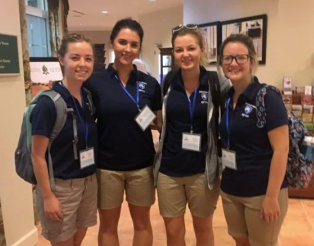
Several years ago, Penn State’s department of Recreation, Park and Tourism Management conducted a survey of alumni and other professionals and asked “how are we doing?” We asked respondents to reflect on the skills and competencies that our students have demonstrated on the job. Our goal was to make sure our curriculum is offering what is required for the entry level professional to be successful in our field. The results were interesting.
We learned that our students are doing great with hard skills and the theoretical foundation to contribute to their agencies and to the field at large. We also heard that today’s student is falling short on soft skills.
Other research supports our findings. Skills such as interpersonal skills, technology etiquette, etc. that many of us old timers consider to be key to professional success are lacking for many of this generation.
For example, this summer, an agency supervisor reflected on the performance evaluation of the intern at his agency. “He’s doing a good job for us. We just can’t get him to put down his phone.” Over the years, I observed students having an increasingly more difficult time with things like picking up the phone and actually talking with someone to set up a meeting time; they want to do everything over email. Group projects are no longer about trying to find a time in between classes and work meet in person. They are using apps like “GroupME” and in place of sitting around a table and working things out.
In response, RPTM developed a short course that addresses the skills that are crucial in our field and the many others that work with people.
We start with the “elevator pitch” and how to make a great first impression. Eye contact. A firm handshake. The cell phone neatly tucked away in one’s purse or pocket. Professional dress that is suitable for the work environment.
The students develop a “script” for making calls to potential internship agencies or pretend customers and we discuss what needs to be in a phone message if the person doesn’t answer.
We discuss how to effectively use the subject line to get the attention of the intended receiver and the use of salutations and grammar and eliminating text language in emails. We even cover the concept of business hours. I can’t tell you how many times a student has emailed me in the evening – after this not so young professional has gone to bed – expecting a response about an appoint or a class early the next morning.
The early results have been promising. Students talk about the course assignments as being “fun.” They report that they are gaining confidence that will hopefully transfer to successful interactions when they arrive at their internship sites.
Our collaboration with our industry partners is a crucial part of the education process. The faculty and staff in RPTM at Penn State values your willingness to support our program and our students. Continue to let us know how we are doing.
by Patty Kleban
Undergraduate Coordinator, Senior Instructor
Penn State University Recreation, Park, and Tourism Management
 Several years ago, Penn State’s department of Recreation, Park and Tourism Management conducted a survey of alumni and other professionals and asked “how are we doing?” We asked respondents to reflect on the skills and competencies that our students have demonstrated on the job. Our goal was to make sure our curriculum is offering what is required for the entry level professional to be successful in our field. The results were interesting.
We learned that our students are doing great with hard skills and the theoretical foundation to contribute to their agencies and to the field at large. We also heard that today’s student is falling short on soft skills. Other research supports our findings. Skills such as interpersonal skills, technology etiquette, etc. that many of us old timers consider to be key to professional success are lacking for many of this generation.
For example, this summer, an agency supervisor reflected on the performance evaluation of the intern at his agency. “He’s doing a good job for us. We just can’t get him to put down his phone.” Over the years, I observed students having an increasingly more difficult time with things like picking up the phone and actually talking with someone to set up a meeting time; they want to do everything over email. Group projects are no longer about trying to find a time in between classes and work meet in person. They are using apps like “GroupME” and in place of sitting around a table and working things out.
In response, RPTM developed a short course that addresses the skills that are crucial in our field and the many others that work with people.
We start with the “elevator pitch” and how to make a great first impression. Eye contact. A firm handshake. The cell phone neatly tucked away in one’s purse or pocket. Professional dress that is suitable for the work environment.
The students develop a “script” for making calls to potential internship agencies or pretend customers and we discuss what needs to be in a phone message if the person doesn’t answer.
We discuss how to effectively use the subject line to get the attention of the intended receiver and the use of salutations and grammar and eliminating text language in emails. We even cover the concept of business hours. I can’t tell you how many times a student has emailed me in the evening – after this not so young professional has gone to bed – expecting a response about an appoint or a class early the next morning.
The early results have been promising. Students talk about the course assignments as being “fun.” They report that they are gaining confidence that will hopefully transfer to successful interactions when they arrive at their internship sites.
Our collaboration with our industry partners is a crucial part of the education process. The faculty and staff in RPTM at Penn State values your willingness to support our program and our students. Continue to let us know how we are doing.
by Patty Kleban
Undergraduate Coordinator, Senior Instructor
Penn State University Recreation, Park, and Tourism Management
Several years ago, Penn State’s department of Recreation, Park and Tourism Management conducted a survey of alumni and other professionals and asked “how are we doing?” We asked respondents to reflect on the skills and competencies that our students have demonstrated on the job. Our goal was to make sure our curriculum is offering what is required for the entry level professional to be successful in our field. The results were interesting.
We learned that our students are doing great with hard skills and the theoretical foundation to contribute to their agencies and to the field at large. We also heard that today’s student is falling short on soft skills. Other research supports our findings. Skills such as interpersonal skills, technology etiquette, etc. that many of us old timers consider to be key to professional success are lacking for many of this generation.
For example, this summer, an agency supervisor reflected on the performance evaluation of the intern at his agency. “He’s doing a good job for us. We just can’t get him to put down his phone.” Over the years, I observed students having an increasingly more difficult time with things like picking up the phone and actually talking with someone to set up a meeting time; they want to do everything over email. Group projects are no longer about trying to find a time in between classes and work meet in person. They are using apps like “GroupME” and in place of sitting around a table and working things out.
In response, RPTM developed a short course that addresses the skills that are crucial in our field and the many others that work with people.
We start with the “elevator pitch” and how to make a great first impression. Eye contact. A firm handshake. The cell phone neatly tucked away in one’s purse or pocket. Professional dress that is suitable for the work environment.
The students develop a “script” for making calls to potential internship agencies or pretend customers and we discuss what needs to be in a phone message if the person doesn’t answer.
We discuss how to effectively use the subject line to get the attention of the intended receiver and the use of salutations and grammar and eliminating text language in emails. We even cover the concept of business hours. I can’t tell you how many times a student has emailed me in the evening – after this not so young professional has gone to bed – expecting a response about an appoint or a class early the next morning.
The early results have been promising. Students talk about the course assignments as being “fun.” They report that they are gaining confidence that will hopefully transfer to successful interactions when they arrive at their internship sites.
Our collaboration with our industry partners is a crucial part of the education process. The faculty and staff in RPTM at Penn State values your willingness to support our program and our students. Continue to let us know how we are doing.
by Patty Kleban
Undergraduate Coordinator, Senior Instructor
Penn State University Recreation, Park, and Tourism Management
